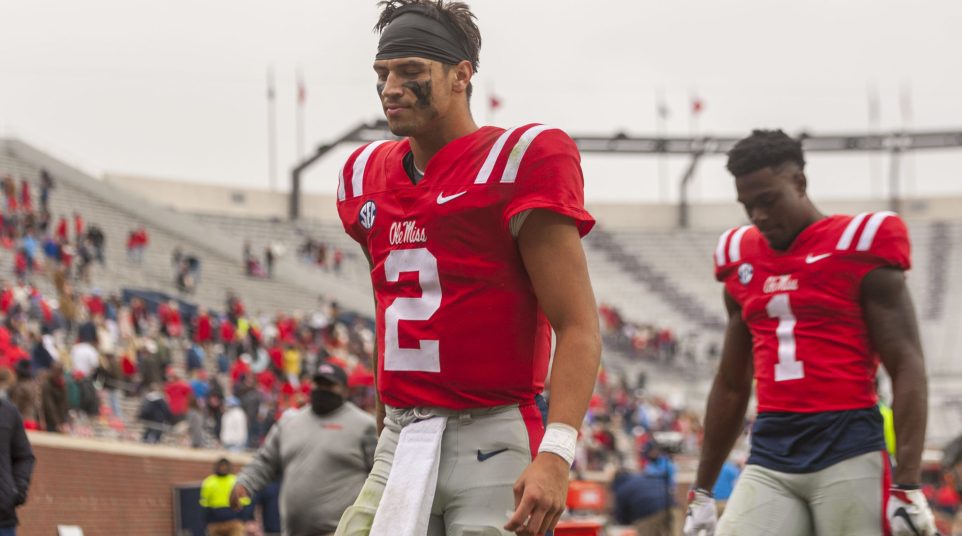
Ole Miss football: The case for sticking with Matt Corral
Three weeks ago, Ole Miss’ long-term future at quarterback seemed to be cemented. The Rebels had just taken Alabama to the wire in a 63-48 defeat, dragging along their atrocious defense and still giving themselves a chance to win in the fourth quarter despite the Tide scoring touchdowns on eight straight possessions.
Matt Corral was spectacular for the third game in a row. He threw for 365 yards on 21-of-28 passing with 2 touchdowns. To that point, Corral had turned the ball over just once on the season, and it was an interception against Florida that could be put more on the offensive line than on him.
What a different world Lane Kiffin’s program is in a few short weeks later, or so we think. Corral has turned the football over 9 times in the past two games with 8 interceptions. His decision-making has been poor, and his accuracy nearly 20 percentage points lower than what it was in the season’s first three weeks. Corral’s 6-interception game in Fayetteville was thought, or rather hoped, to be an aberration. It was perhaps a major yet inevitable speed bump in the maturation of a passer with less than a full season of starting under his belt. But then came the Auburn game, where an opening-drive 3-and-out was followed by a back-breaking interception in the end zone that prevented Ole Miss from taking an early lead.
For the next series, John Rhys Plumlee — the player Corral crushed in a brief offseason in-name-only quarterback competition — entered the game, and the two split time the rest of the way. It was somewhat effective, but not totally unpredictable.
Kiffin and his staff clearly do not trust Plumlee to throw the ball enough to be an every-down quarterback. If the fact that Plumlee didn’t get a shot after Corral’s fifth interception at Arkansas weren’t evidence enough, the sophomore threw just once for 7 yards in the 35-28 loss to Auburn. Plumlee is a great athlete and a skilled runner; there is no denying that. But it was Corral calling the signals in virtually every passing down. It was shades of a 2019 Rich Rodriguez offense, only with a sliver of rhyme, rhythm and competence.
With all that being true, what does Ole Miss do going forward? To contradict the opening of this column to a degree: For the short term, Corral should start, simply because of the lack of a suitable alternative. Kiffin will likely recruit talent to make the 2020 offseason competitive, but that is a different conversation. This coaching staff doesn’t trust Plumlee to throw, and you cannot run a competent offense in this conference without being a threat to throw somewhat consistently. Rodriguez proved that last year.
So what do you have to lose starting Corral? Expectations were low for this club to begin the year, and they are diminishing in importance with the strange pandemic-shortened season that is unfolding.
Though it seems like he has been touted as the face of the program for three years, Corral has only nine starts under his belt. Use this strange, somewhat throwaway season to teach him hard lessons. Ten SEC games is bound to teach him something, and they will certainly prove whether he is a capable quarterback in this league. Unless it gets to the point of incompetence, live with the good and bad with Corral. He’s learning. The arm talent is there. Can his decision-making and vision catch up? See what you have, then reassess in the spring of 2020, because the staff seems convinced the other option in Plumlee is a known commodity.
The only question left is how both quarterbacks coexist without eroding Corral’s confidence or stunting his development. Again, Plumlee is a special athlete, and his skill set is too dynamic to leave him on the sideline for four quarters. There is a package to be used that exploits his speed. What that looks like is up to Kiffin and offensive coordinator Jeff Lebby.
Corral is the guy until the end of 2020. What he does with this opportunity and how he handles this dose of adversity will paint the picture of Ole Miss’ long-term future at quarterback.
